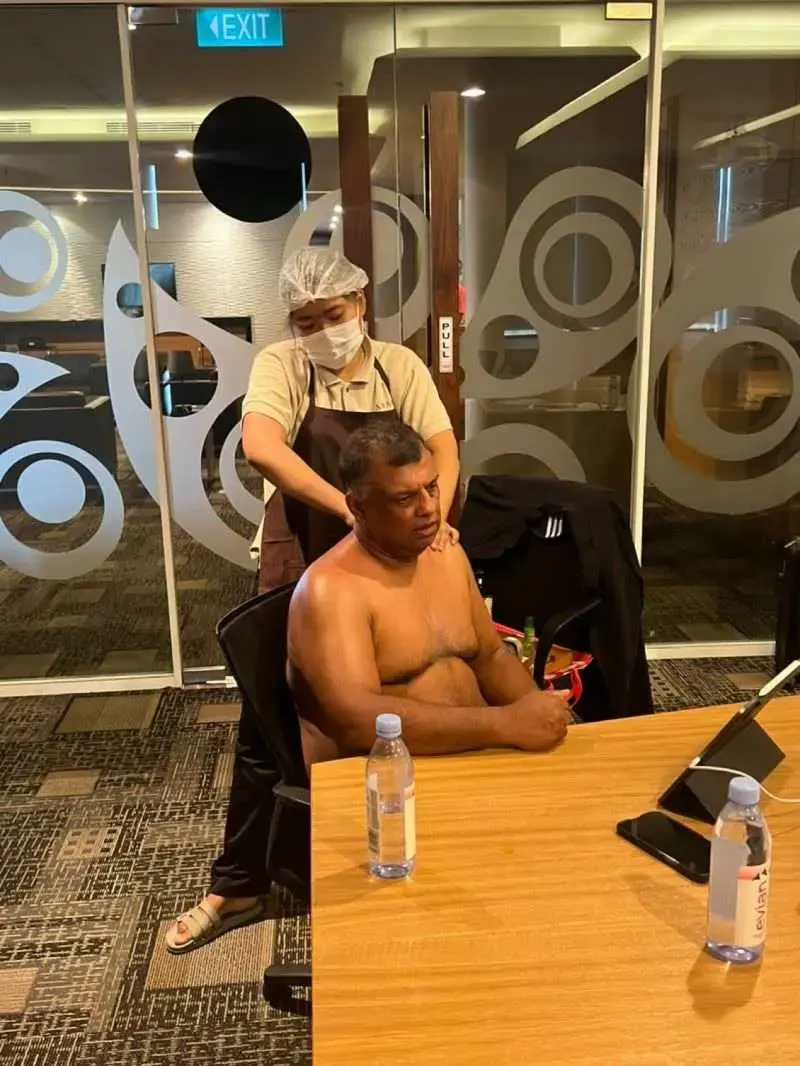11-11-2023 (KUALA LUMPUR) In the era of remote work and flexible schedules, employees have found themselves attending important virtual meetings in their pyjamas or with their lunch in hand. As organisations strive to strike a balance between professionalism and flexibility, behaviours that were once deemed unconventional have been embraced. However, what happens when the boundaries of professionalism are pushed to the extreme, such as a boss appearing half-naked and receiving a massage during a Zoom call? This eyebrow-raising incident occurred during an AirAsia management meeting last month when CEO Tony Fernandes proudly shared a photo of himself topless on LinkedIn.
The photo was accompanied by a caption that read, “Got to love Indonesia and AirAsia culture that I can have a massage and do a management meeting.” The reaction on social media was swift and critical, with many questioning the professionalism of Fernandes’ behavior and the poor judgment of posting such a photo online.
By sharing this photo on a professional networking site, Fernandes implicitly conveyed the message that such behavior is acceptable within the company. This raises concerns about AirAsia’s corporate culture and its alignment with broader norms of professionalism. Why would top executives engage in such behavior in the first place?

Every company has its own unique culture, shaped by organizational values and beliefs. Some prioritize innovation and openness, while others emphasize obedience and subordination. The behavior of leaders sets the standards of conduct within the company.
Across various cultures, leaders are often celebrated for their visionary, unconventional, and assertive qualities. The GLOBE study, which examined cross-cultural leadership ideals in 24 countries, found that these traits were highly valued, particularly in top management.
However, when organizations value non-conformity in their leaders, they may inadvertently select individuals whose professional and personal boundaries are blurred. This can create challenges in managing behavior and lead to a rise in actions that diverge from traditional norms of professionalism.
In Asian companies like AirAsia, there is often a culture of deference to authority that can further embolden executives to cross the line of acceptability. While Fernandes’ behavior may be justified as part of a relaxed, easy-going, and informal workplace culture, it is unlikely that other AirAsia employees would be able to get away with the same behavior in a professional meeting. Rather than being solely a matter of culture, it is probably Fernandes’ position of status and authority that allowed him to behave in such a manner, raising questions about power dynamics within the company.
Furthermore, Tony Fernandes has cultivated a public persona characterized by his unorthodox approach to business and willingness to take risks. Some supporters have defended his behavior, citing his unconventional leadership style and his right to align his actions with his personal brand. However, there is a delicate balance between individuality and the image of the company when it comes to personal branding. While individuality and personal branding are important, there must be a respect for boundaries. CEOs’ behaviors are not merely personal; they are integral facets of a company’s branding and reputation.
Personal conduct can pose a reputational risk for companies. For example, Bernard Looney, the former CEO of BP, resigned due to a failure to fully disclose previous relationships with colleagues. BP stated that leaders are “expected to act as role models and to exercise good judgment.” The actions and values of leaders, such as Warren Buffett’s conservative and value-driven investment approach, contribute to shaping the reputation of their companies.
Similarly, Fernandes’ actions can influence AirAsia’s branding, either positively or negatively. In 2017, a video of him collecting rubbish from passengers aboard a flight went viral, earning praise for his positive treatment of employees. However, his recent behavior could potentially deter talent or be seen as a sign of unorthodox leadership that disregards established norms.
To preserve brand equity, it is crucial to ensure that a leader’s actions align with the company’s values and expectations. Leaders are expected to be role models who influence and empower others toward a shared goal. Psychological research has shown that having power can reduce one’s sense of inhibition. In the case of AirAsia, it might be a lack of foresight rather than a deliberate intent to flout professional norms or disrespect others.
To enable leaders to express authenticity and unconventionality while maintaining acceptable behavior boundaries, it is important to establish a system of checks and balances. This can be achieved by flattening organizational structures to reduce hierarchical barriers and by creating a culture where employees can voice concerns without fear of backlash. Ultimately, while the workplace may have become more flexible, it is still a professional setting where respect and professionalism should prevail, even in the pursuit of comfort and flexibility.




